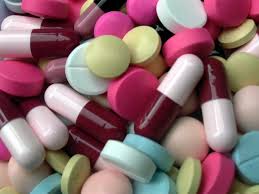antibiotic
英 [ˌæn.ti.baɪˈɒt.ɪk]
美 [ˌæn.t̬i.baɪˈɑː.t̬ɪk]
- adj. 抗生的;抗菌的
- n. 抗生素,抗菌素
使用频率:

记忆方法
将“anti-”看作是“反对”或“对抗”,而“biotic”与“bio-”相关,代表“生命体”。所以,“antibiotic”可以想象成“对抗生命的”,即一种对抗或抑制细菌等微生物生长的化合物。这种联想有助于记忆这个单词的含义。
以上内容由AI生成, 仅供参考和借鉴
中文词源
antibiotic 抗生素
前缀anti-, 相对。词根bio, 生命。
英语词源
- antibiotic (adj.)
- 1894, "destructive to micro-organisms," from French antibiotique (c. 1889), from anti- "against" (see anti-) + biotique "of (microbial) life," from Late Latin bioticus "of life" (see biotic). As a noun, first recorded 1941 in works of U.S. microbiologist Selman Waksman (1888-1973), discoverer of streptomycin. Earlier the adjective was used in a sense "not from living organisms" in debates over the origins of certain fossils.
权威例句
- 1. Our doctor diagnosed a throat infection and prescribed antibiotic and junior aspirin.
- 我们的医生诊断是喉部感染,并且开了一些抗生素和小剂量阿司匹林。
- 2. They expect the antibiotic products to be exported to Southeast Asia and Africa..
- .他们希望向东南亚和非洲出口抗生素产品。
- 3. The doctor said that I should take some antibiotic.
- 医生说我应该服些用抗生素.
- 4. The most efficient antibiotic cannot compensate for inadequate and poor surgical technique.
- 最有效的抗菌素不能补偿不适当的粗劣的外科技术.
- 5. Bacteria vary greatly in their sensitivity to the antibiotic penicillin.
- 不同的细菌种类对抗菌素青霉素的反应很不同.